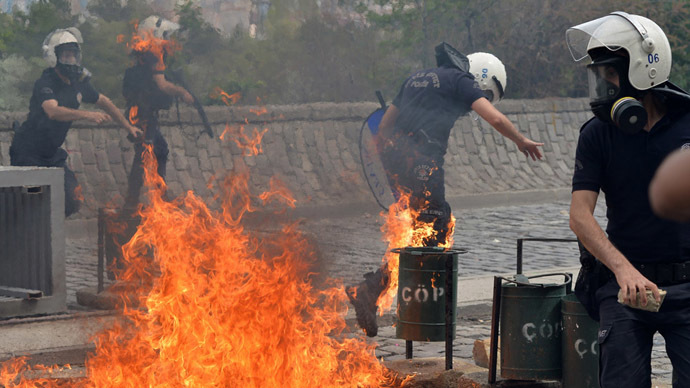Alwaght-Turkey’s warplanes and artillery repeatedly bombed the camps of the Kurdistan Workers’ Party (PKK) in the country’s southeast late on Monday, marking the military’s first significant offensive against PKK, since peace talks began two years ago . In a separate incident also Monday, Turkish attack helicopters struck suspected PKK targets around the village of Geyiksuyu in eastern Turkey following raids by the rebels .
Although Davutoglu said “Peace talks started before Kobani happened and are not tied to any foreign event…The peace process will be carried out with determination, the move poses a new threat to negotiations between the government and the PKK. Peace talks between Turkey government and PKK have become increasingly strained in recent weeks in the face of Turkey’s refusal to help rout ISIS terrorists across its border in Syria, where Kurds face the risk of a massacre .
According to media reports, Monday’s strikes came in retaliation for armed PKK offensives on several military outposts in the area. The reports claim that the targeted PKK units had been attacking Dağlıca military posts using rocket-propelled grenades and small-arms fire for three days .
The Turkish chief of general staff said the military “opened fire immediately in retaliation, in the strongest terms” after repeated PKK attacks in the area, and before air strikes were launched .
The Turkish daily Hürriyetreported that the air strikes caused “major damage” to the PKK, while the Kurdish Firat news agency said there had not yet been any confirmation of casualties and losses on the rebel side .
The People’s Defence Force (HPG), the armed wing of the PKK, confirmed several air strikes in Hakkari province. “After almost two years the occupying Turkish army conducted a military operation against our forces yesterday for the first time […] with these air strikes they violated the ceasefire,” a statement read .
“Around Daglica in Hakkari, very serious harassment fire took place,” Prime Minister Ahmet Davutoglu said Tuesday in Ankara. “It is impossible for us to show patience or make concessions against this. Our armed forces took the necessary precautions. The peace talks are not an alternative to public safety .”
The PKK accused Turkey of breaching the cease-fire with repeated strikes on Monday afternoon, according to a statement published Tuesday on the Kurdish-run Firat news agency .
Turkish forces and the PKK have sporadically exchanged fire in momentary breaches of a cease-fire that has largely held since March 2013, when jailed PKK leader Abdullah Ocalan called on his militia to halt fighting, in a landmark moment for the peace process. This week’s airstrikes by F-16s mark Ankara’s most decisive operation against the group since then, but it wasn’t immediately clear if it marked a change in official strategy .
Mounting violence between the military and the PKK came just as the government presented its latest proposal to Kurdish lawmakers on Monday, seeking to press ahead with the negotiations to end a three-decade insurgency that has killed 40,000 people .
The bombings follow months of tensions between the military and the PKK, especially as the Kurdish militants increased their activity along Turkey’s porous southern borders to aid their kin in Iraq and Syria .
The strikes also come as Ankara refuses to aid Kurds in their fight against Islamic State in Syria’s Kobani region, straining relations with Kurds in Turkey. Comprising about 18% of the country’s 77 million people, Kurds staged massive protests—including burning schools and attacking businesses and official buildings—across Turkey last week, when more than three dozen people were killed in clashes with the police .
Meanwhile, Syrian Kurds in Kobani rejected claims by Iraq’s Kurdistan regional government that military aid had secretly been delivered to forces battling Isis. “We have not received any military aid from anyone so far,” said Idris Nassan, deputy foreign minister of the Kobani administration. “We would have made such aid public for sure .”
A number of those killed in clashes between PKK supporters and members of the Free Cause party (Hüda Par), thought to be linked to Hezbollah, a Sunni militant group from Turkey that gained notoriety in the 1990s when it was recruited by the Turkish “deep state” to murder and torture hundreds of PKK members and supporters in the region. Hüda Par leaders rejected all responsibility for the violence last week and accused PKK members of deliberate provocation and political exploitation of the situation in Kobani .
Observers fear that tensions between the PKK and their Sunni Islamist rivals might stir wider unrest and derail the Turkish peace process. The air strikes are the first major mutual break of the ceasefire since the peace process was launched in 2012 as an effort to end a bloody conflict that has killed more than 40,000 people in 30 years .



























